
MICROBIOLOGY
Scope & Guideline
Pioneering Research in Environmental and Clinical Microbiology
Introduction
Aims and Scopes
- Microbial Ecology and Diversity:
Research on the ecological roles and diversity of microorganisms in various environments, including extreme habitats, aquatic systems, and terrestrial ecosystems. - Biotechnological Applications of Microorganisms:
Studies that explore the use of microorganisms in bioremediation, biofuel production, and as biocatalysts for industrial processes. - Microbial Pathogenesis and Antibiotic Resistance:
Investigations into the mechanisms of pathogenicity in bacteria, fungi, and viruses, with a focus on antibiotic resistance and the development of new antimicrobial agents. - Microbial Genetics and Genomics:
Research involving genetic analysis of microbial strains, including genome sequencing, gene expression studies, and metabolic pathways. - Interactions Between Microorganisms and Higher Organisms:
Exploration of symbiotic relationships, such as those between microbes and plants or animals, including studies on probiotics and microbiomes. - Environmental Microbiology:
Examination of microbial processes in natural environments, including biogeochemical cycles, biodegradation of pollutants, and microbial responses to environmental changes.
Trending and Emerging
- Microbiome Research:
There is a growing interest in studying complex microbial communities, particularly in relation to human health, agriculture, and environmental sustainability. - Biodegradation and Bioremediation Technologies:
Research on the use of microorganisms for the degradation of pollutants and waste materials is trending, driven by the need for sustainable solutions to environmental challenges. - Antimicrobial Resistance Mechanisms:
Increasingly, studies are focusing on understanding the genetic and biochemical pathways that lead to antimicrobial resistance, along with strategies to combat this growing threat. - Synthetic Microbiology and Genetic Engineering:
The application of synthetic biology and genetic engineering techniques to manipulate microbial systems for biotechnological applications is emerging as a significant area of interest. - Microbial Interactions and Network Dynamics:
There is a trend towards understanding how microorganisms interact within communities and how these interactions influence ecological and evolutionary outcomes. - Extreme Environment Adaptations:
Research into how microorganisms adapt to extreme conditions (e.g., high salinity, temperature, or pressure) is gaining attention, with implications for biotechnology and astrobiology.
Declining or Waning
- Traditional Microbial Taxonomy:
Research focused solely on the classical taxonomy and identification of microorganisms has decreased, as molecular techniques and genomic approaches have taken precedence. - Single-Organism Studies:
Investigations centered on individual microbial species without consideration of community dynamics or ecological interactions are becoming less common, with a shift towards more integrative approaches. - Basic Microbial Physiology:
Studies that focus exclusively on fundamental physiological processes of microbes are waning, as there is a growing emphasis on applied microbiology and ecological interactions. - Pathogen-Specific Studies without Broader Context:
Research that looks at specific pathogens in isolation, without considering their interactions with other microorganisms or their ecological roles, is seeing reduced interest.
Similar Journals

JOURNAL OF MICROBIOLOGY
Exploring the unseen world of microorganisms.JOURNAL OF MICROBIOLOGY, published by the Microbiological Society Korea, is a prestigious peer-reviewed journal dedicated to the advancement of knowledge in the fields of microbiology, applied microbiology, and biotechnology. Established in 1996, this journal serves as a vital platform for researchers and professionals from around the globe to disseminate their findings and engage in multidisciplinary discussions pertaining to microbial sciences. With an H-index that reflects its impact, the journal holds a commendable Q2 ranking in key categories including Applied Microbiology and Biotechnology, as well as Medicine (Miscellaneous), which underscores its significance in the academic community. Despite being a subscription-based journal, the JOURNAL OF MICROBIOLOGY aims to contribute to the understanding of microbial processes and their applications, facilitating advancements that are essential in health, industry, and environmental sciences. Researchers, students, and practitioners are encouraged to explore this rich resource for the latest research and trends in microbiology.
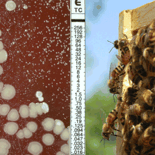
mBio
Empowering scientists with cutting-edge microbiological insights.mBio is a premier, peer-reviewed open-access journal published by the American Society for Microbiology, dedicated to advancing the field of microbiology and virology. With an impressive impact factor and a commendable standing within the top quartiles (Q1) of both microbiology and virology categories as of 2023, mBio offers a dynamic platform for researchers and professionals to disseminate high-quality, rigorous scientific findings. Since its inception in 2010, it has served as a vital resource for the global scientific community, facilitating open access to groundbreaking research that spans diverse topics within microbiology. With a Scopus ranking of #28 out of 182 in Microbiology and #16 out of 80 in Virology, mBio significantly influences ongoing research trends and informs best practices in the field. Its commitment to open-access publishing allows for widespread visibility and accessibility, ensuring that critical discoveries reach a broad audience, including students and academics eager to contribute to, and learn from, cutting-edge science.
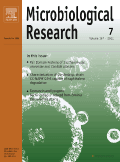
MICROBIOLOGICAL RESEARCH
Pioneering Insights in Microbiology ResearchMICROBIOLOGICAL RESEARCH, published by Elsevier GmbH, serves as a leading platform for advancements in the field of Microbiology, holding an impressive Q1 ranking in its category as of 2023. With an ISSN of 0944-5013 and E-ISSN 1618-0623, this journal has been instrumental in disseminating high-quality research since its inception in 1994 and continues to contribute significantly to the academic landscape through 2024. Positioned within the top 13% of publications in the Immunology and Microbiology category, ranked #24 out of 182 according to Scopus, it attracts the attention of researchers, professionals, and students alike. While the journal is not open access, it offers vital insights and peer-reviewed articles that drive innovation and exploration within microbiological research. Its rigorous selection process underscores the importance of quality and relevance in advancing knowledge in this dynamic field.

Microorganisms
Connecting global minds in microbial sciences.Microorganisms is a leading open-access journal published by MDPI based in Switzerland, catering specifically to the rapidly evolving fields of microbiology and virology. Since its inception in 2013, the journal aims to foster the dissemination of high-quality research through its comprehensive and interdisciplinary platform, with a particular focus on both fundamental and applied microbiological sciences. Contributing to its esteemed reputation, Microorganisms holds a commendable Q2 ranking in the categories of Microbiology and Virology, as well as in Medical Microbiology, highlighting its significance in the academic community. With a consistent impact, evidenced by its rankings in Scopus—such as rank #25 in Virology and #56 in Microbiology—the journal serves as an invaluable resource for researchers, professionals, and students looking to stay at the forefront of microbiological research. As an open-access journal, Microorganisms ensures that vital research findings are readily available to a global audience, promoting collaboration and innovation in the study of microbial life and its implications for health and disease.

mLife
Unveiling the mysteries of microorganisms through rigorous research.Welcome to mLife, an emerging journal at the forefront of microbiological research published by the esteemed WILEY in China. With its ISSN 2097-1699 and E-ISSN 2770-100X, mLife serves as a vital platform for scholars and practitioners aiming to advance their understanding of microbial sciences. With an impressive Q2 ranking in the Microbiology category and a Scopus rank of 143 out of 182, mLife is quickly establishing itself as a valuable source of cutting-edge research. The journal, covering a range of innovative topics from immunology to environmental microbiology, provides an engaging venue for disseminating high-quality research findings aimed at addressing real-world challenges. Authors and readers alike benefit from its accessibility features that encourage scholarly collaboration and information sharing. As we converge on the rich microbial landscapes from 2022 to 2024, mLife is committed to fostering a community dedicated to rigorous research and impactful discoveries.
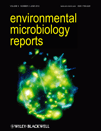
Environmental Microbiology Reports
Exploring the Microbial World of Environmental InteractionsEnvironmental Microbiology Reports, published by WILEY, is a prestigious journal dedicated to the field of environmental microbiology, exploring the intricate interactions between microorganisms and their environments. With an ISSN of 1758-2229, this journal has established itself as a crucial resource for researchers, professionals, and students interested in the latest advancements and applications in microbial ecology, soil science, and environmental sustainability. Since its inception in 2009, the journal has grown in impact and reputation, proudly ranked in the Q1 category for both Agricultural and Biological Sciences and Ecology, Evolution, Behavior and Systematics as of 2023. Notably, it occupies the 17th position out of 193 in its subcategory based on Scopus rankings, showcasing its significance within the field. Although it does not currently offer open access options, the high-quality research published in this journal continues to contribute significantly to the understanding of microbial roles in environmental processes, emphasizing the vital role of microbes in maintaining ecosystem health and promoting sustainable practices.

Malaysian Journal of Microbiology
Unleashing the Power of Microbes: Open Access for AllMalaysian Journal of Microbiology is a prestigious open-access journal dedicated to advancing the field of microbiology, published by the Malaysian Society for Microbiology. Since its inception in 2005, this journal has become an essential platform for researchers and practitioners, facilitating the dissemination of innovative studies in applied microbiology, biotechnology, and infectious diseases. Based in Penang, Malaysia, this journal not only focuses on local microbiological research but also positions itself within the broader global scientific community. Although currently placed in the Q4 category in several relevant fields—including Applied Microbiology and Biotechnology, Infectious Diseases, and Medical Microbiology according to the 2023 Scopus rankings—it plays a crucial role in encouraging novel research and fostering collaboration among scientists. The journal encourages submissions that contribute to the understanding of microbial processes, disease mechanisms, and novel biotechnological applications, thereby supporting the continuous growth of knowledge in microbiology. With open access since its launch, the Malaysian Journal of Microbiology ensures that all published works are freely available to the public, enhancing their visibility and impact within the scientific community.

ANTONIE VAN LEEUWENHOEK INTERNATIONAL JOURNAL OF GENERAL AND MOLECULAR MICROBIOLOGY
Driving Progress in General and Molecular MicrobiologyANTONIE VAN LEEUWENHOEK INTERNATIONAL JOURNAL OF GENERAL AND MOLECULAR MICROBIOLOGY, published by Springer, is a vital resource for advancing research in the fields of microbiology and molecular biology. With its ISSN 0003-6072 and E-ISSN 1572-9699, this journal consistently focuses on cutting-edge studies and developments, providing a platform for the dissemination of knowledge that spans over its rich history from 1934 onwards. The journal holds an impressive reputation, ranked Q2 in Medicine (miscellaneous) and Q3 in both Microbiology and Molecular Biology for 2023, reflecting its significant contribution to the scientific community. Researchers and professionals from various disciplines rely on this journal for quality publications that address complex microbial interactions and molecular mechanisms. Although it currently does not provide open access options, its compelling research remains accessible through institutional subscriptions, allowing it to foster collaborative advancements in the ever-evolving landscape of microbiological sciences.
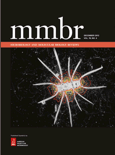
MICROBIOLOGY AND MOLECULAR BIOLOGY REVIEWS
Exploring the Intricacies of Life at the Microbial LevelMICROBIOLOGY AND MOLECULAR BIOLOGY REVIEWS, published by the American Society for Microbiology, is a premier journal dedicated to advancing the fields of microbiology and molecular biology. With an impressive impact factor reflective of its Q1 ranking in categories such as Immunology, Infectious Diseases, and Molecular Biology, this journal consistently showcases high-quality, peer-reviewed articles that contribute to the current understanding of microbial life and molecular mechanisms. Operating since 1997, the journal aims to bridge the gap between microbiological methods and molecular biology applications, making it an essential resource for researchers, professionals, and students alike. Readers can access content through various platforms, ensuring that the latest findings are readily available to the scientific community. With its esteemed reputation, MICROBIOLOGY AND MOLECULAR BIOLOGY REVIEWS remains a leading voice in the exploration of the life sciences, catering to a broad audience deeply invested in unraveling the complexities of microbial and molecular systems.
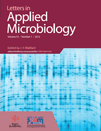
LETTERS IN APPLIED MICROBIOLOGY
Connecting Experts Through Groundbreaking Microbial StudiesLETTERS IN APPLIED MICROBIOLOGY, published by OXFORD UNIVERSITY PRESS, is a prominent journal in the field of applied microbiology, serving as an essential platform for researchers and professionals to disseminate innovative findings. With an ISSN of 0266-8254 and an E-ISSN of 1472-765X, this peer-reviewed journal has been contributing to the scientific community since 1985 and continues to engage with cutting-edge research through 2024. With its current Scopus ranking placing it in the 45th percentile of its category, specifically at rank #70 out of 127 in the Applied Microbiology and Biotechnology field, it underscores its significance in advancing knowledge and applications pertinent to microbial science. Although it is not open access, LETTERS IN APPLIED MICROBIOLOGY offers comprehensive insights aimed at enhancing the understanding of microbiological phenomena in practical scenarios, making it a valuable resource for both seasoned experts and emerging scholars.